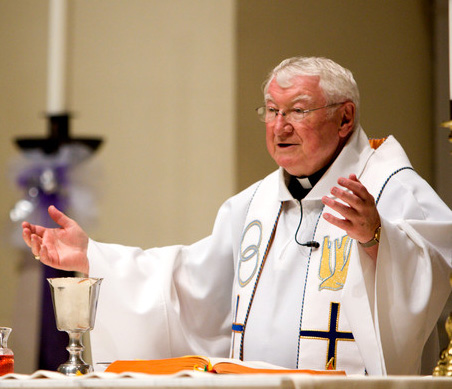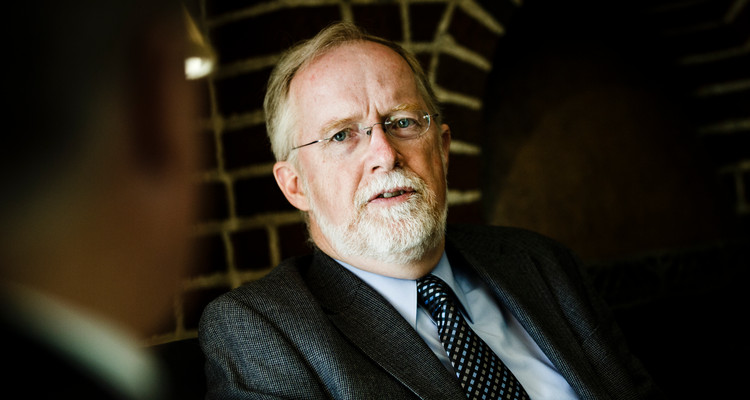John A. Ryan Institute for Catholic Social Thought
Monsignor John Augustine Ryan (1869-1945)
Minnesota native and St. Thomas graduate John A. Ryan is one of the most prominent moral theologians and advocates for social justice in the history of the Church. During most of his lifetime, he advanced social reforms such as a minimum wage, unemployment insurance, the income tax, eight-hour work days, restrictions on child labor, protections for labor unions, and public ownership of mines, forests and utilities. For such positions, he was often accused of being a socialist, but he considered himself to be neither liberal nor conservative, deriving his viewpoints from a theological basis.
Ryan attended St. Thomas when it was St. Thomas Aquinas Seminary, and he continued his studies first at the Saint Paul Seminary and later at the Catholic University of America. He returned to Minnesota to teach moral theology at the Saint Paul Seminary from 1902 to 1915 and then accepted a position at the Catholic University, where he taught until 1939.
Pope Leo XIII’s encyclical, Rerum novarum, had a tremendous influence on Ryan’s theological, economic and political views. His Ph.D. essay, “A Living Wage,” was derived from the rights of workers as outlined in Pope Leo’s encyclical. Ten years later, Ryan’s book Distributive Justice: The Right and Wrong of Our Present Distribution of Wealth was published, arguing in favor of both private property and a more equitable division of wealth between labors, landowners, entrepreneurs and capitalists.
Ryan’s scholarly work led to positions of prominence within the Church and the secular realm, including serving as head of the Social Action Department of the National Catholic Welfare Conference and being elected to the Industrial Appeals Board of the National Recovery Administration. Today, the John A. Ryan Institute for Catholic Social Thought is inspired by his writings to examine questions of faith and work.
Terrence J. Murphy Institute for Catholic Thought, Law, and Public Policy
Monsignor Terrence Murphy (1920-2004)
Longtime UST president Terrence Murphy oversaw significant changes to St. Thomas. He began his presidency in 1966 and stepped down in 1991. During that time St. Thomas became coeducational and transformed from the College of St. Thomas, a school of only 2,167 students, to the University of St. Thomas, with 9,120 students. In addition, St. Thomas added campuses in Minneapolis, Owatonna and Chaska, and added 12 graduate programs, including its first two doctoral programs.
Murphy was born in Watkins, Minnesota, and moved to St. Paul during his childhood. He studied at the Saint Paul Seminary, where his classmates included James Shannon, who served as president at St. Thomas before Murphy, and John Roach, who was archbishop of St. Paul and Minneapolis. Murphy worked in Minnesota parishes and as a military chaplain before coming to St. Thomas to teach religion and study political science. He received his master’s from the University of Minnesota and then went to Georgetown University to obtain his Ph.D. He returned to St. Thomas in 1959 to teach political science. His administrative jobs began in 1961, when he was appointed dean of students. The next year, he was named executive vice president.
Murphy came to the presidency of the university reluctantly. Archbishop Leo Binz met with Murphy twice, urging him to accept the position. He finally cornered Murphy by saying, “You were ordained a priest to offer sacrifice, the sacrifice of the Mass, but the first sacrifice a priest must offer is that of himself. You are now called upon by your bishop to make a sacrifice in the interest of the Church. Are you willing to do that?”
The Terrence J. Murphy Institute for Catholic Thought, Law and Public Policy was born out of Murphy’s interest in having a Catholic law school in the Twin Cities. His will included a bequest that helped provide funds to establish this institute.
Joseph and Edith Habiger Institute for Catholic Leadership
Monsignor James Habiger (1926-2012)
Monsignor James Habiger was a well-known champion for social justice – so much so that St. Thomas awarded him the John A. Ryan award for his contributions to social justice in 1995. Born in North Dakota, Habiger spent most of his childhood in Owatonna, Minnesota. He studied at St. Mary’s Seminary and University in Maryland and later attended the Catholic University of America. He was ordained in 1951.
After returning to Minnesota, Habiger served as pastor in parishes in southern Minnesota, as a high school principal and as superintendent of education for the Diocese of Winona. From 1980 until 1995, he was executive director of the Minnesota Catholic Conference, lobbying the legislature on behalf of Minnesota’s bishops. Fighting against a bill to cut welfare benefits by 30 percent in 1986 and testifying in favor of MinnesotaCare, which was passed in 1992 to provide health insurance for low-income Minnesotans, were among his most notable accomplishments. Also during this time Habiger served as chaplain for the Minnesota Legislature.
Following his retirement from the Minnesota Catholic Conference, Habiger began work in Campus Ministry at the University of St. Thomas as well as performing pastoral work in area parishes.
A seminal moment in his life was when Habiger attended a lecture by John Howard Griffin, author of Black Like Me. “Before my encounter with Mr. Griffin and his book, I had no experience with people of color,” he said. “But now, after Mr. Griffin and his book, I could not ignore the obscenity of racism. I decided then that if I had the resources, I would try to set up a fund to bring speakers or artists to a community where people would be challenged to be servants of the common good.” In 2004, he was able to realize this dream through the establishment of the Joseph and Edith Habiger Institute for Catholic Leadership, named in honor of his parents.
Read more from Perspectives.







